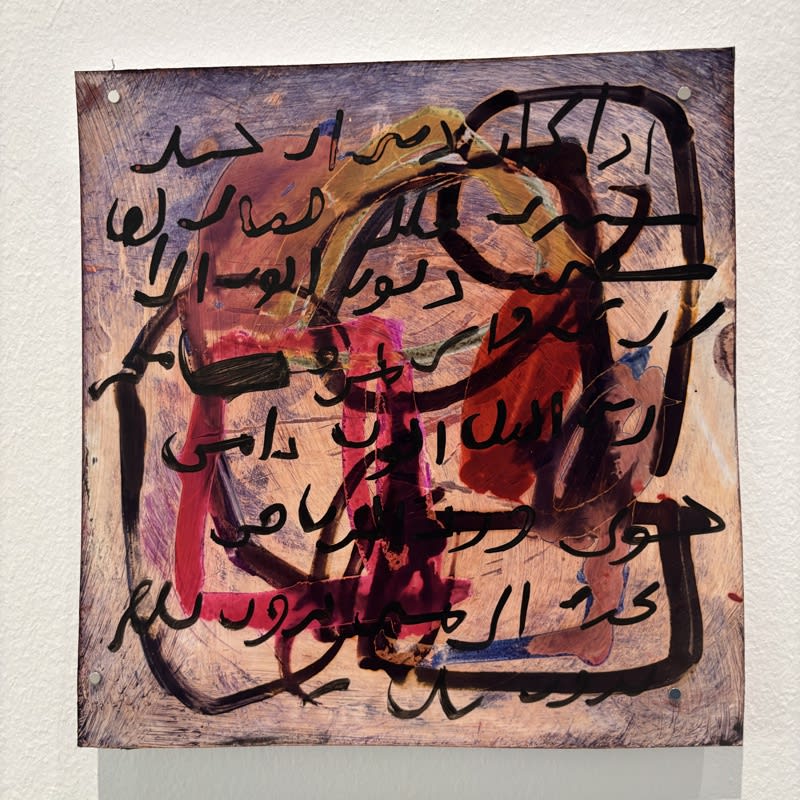
Issam Kourbaj - Urgent Archive drawing detail
Urgent Archive is at Kettle’s Yard Cambridge, in the artist's adopted home city. There is a second concurrent exhibition of Kourbaj's work taking place at the Heong Gallery, Downing College, also in Cambridge, which will not be covered in this post.
Kourbaj has been resident in the UK since 1990. Educated in Damascus, St Petersburg, and London, he has used his ability to communicate across several languages as well as a visual artist to immerse himself in higher education. He works as an artist, lecturer and writer at Cambridge University and the exhibition represents his largest solo project to date.
Issam Kourbaj has selected and cross-referenced a collection of objects, original drawings, poetry, performance, sculpture, text, and video installation to give visitors to the exhibition insight into the destruction of Syria's cultural heritage, and its urban infrastructure. The assemblage follows the course of the bitter civil war that has factionalised his country after the so called ‘Arab Spring’ in 2011. The installation is presented as an archive, formally layered with components that reference his sense of loss, the erosion of a way of life, corruption of democratic power structures, debasement of half of his country's inhabitants and the re-instatement of its oppressor by external powers, Russia and Iran.
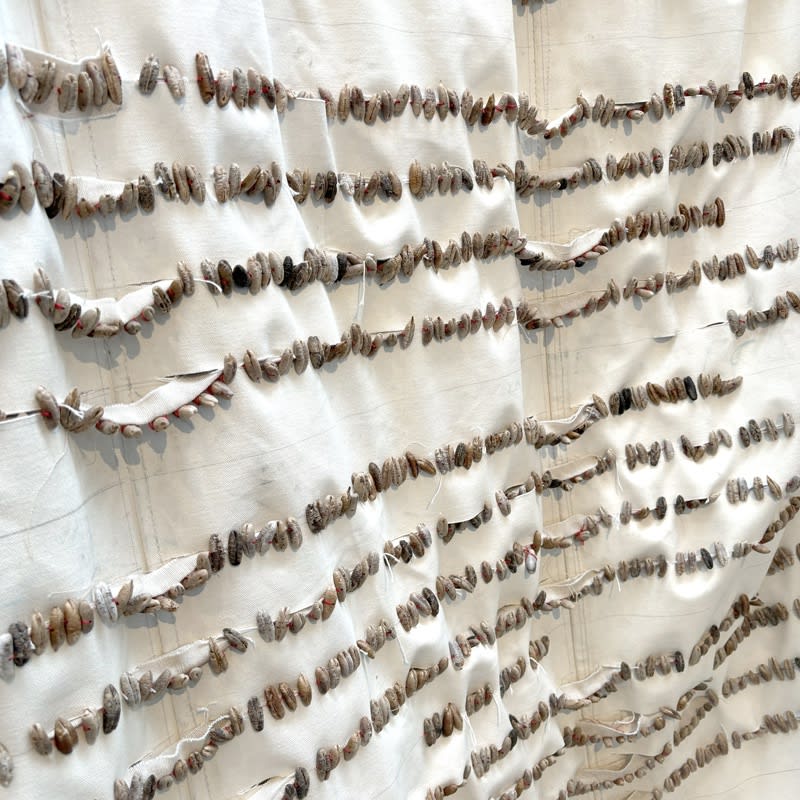
Urgent Archive installation detail
The installation has been compiled with an eclectic assortment of once homely objects that in the artist's hands act like ciphers, lending new meaning to their somewhat altered forms. A tent covered in thousands of date stones stitched onto its surface is hung high on the wall; a crushed child's tricycle is presented on utilitarian grey metal shelving along side calligraphic drawings on paper and on ledgers; sprouting seed trays of young seedlings are optimistic signs of growth and change, right along side dried out ears of wheat, an indication of hope wasted; a smashed camera, and administrative rubber stamps with corrupted text messages are signs of authoritarianism and sense of stasis.
The analogue nature of the content speaks volumes in his presentation. A beautiful jet black typewriter is located above ledgers filled with spidery hand-written poetry. A roll of found thermal paper has been written on with a naked flame. It has been wall-mounted like an ancient Chinese scroll, the text barely legible. The objects have been chosen to be both ordinary and powerful in their simplicity.
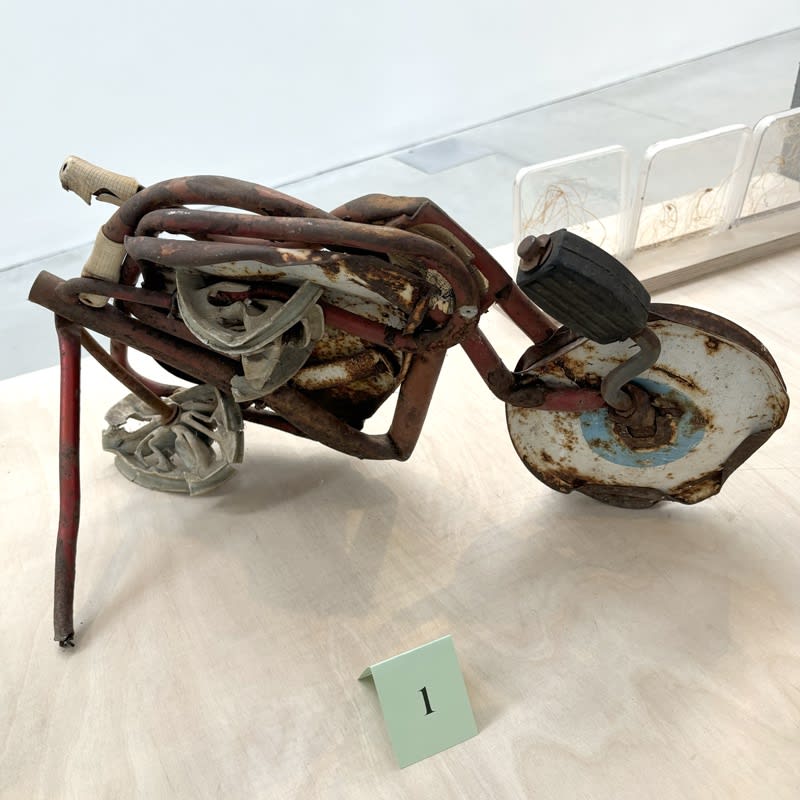
Urgent Archive installation detail
From his vantage point of academic analysis, Kourbaj has been able to record and document developments within Syria using these reminders of 'redundant technology' without loosing any sense of his passion and personal jeopardy as an ‘exile’ in the UK.
He updates the installation regularly. The already desperate situation in Syria has been further impacted by the activities of its immediate neighbour Israel, and regional power Iran, both aggressively aping their colonial predecessors, and in Israel's case, current sponsors, within the region. Since the exhibition has opened in March, cross border incursions and military skirmishes have been carefully calculated by Israel and Iran in a series of tit-for-tat moves to escalate tension and to humiliate the remaining Syrian population in their powerlessness.
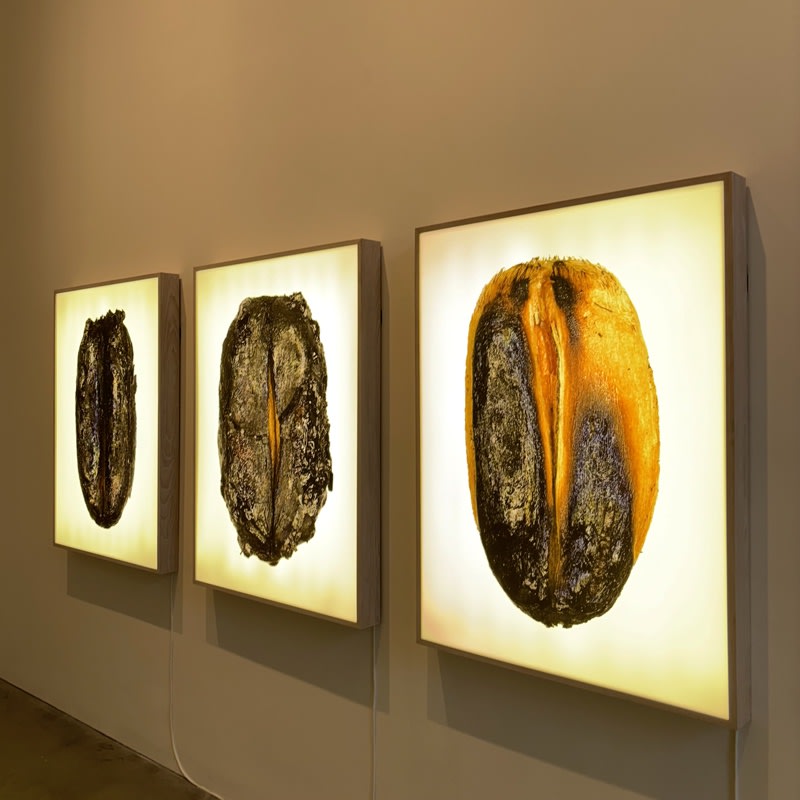
Urgent Archive installation detail
In the second room three close-up photographs of burnt wheat seeds have been blown up and presented on light-boxes. These rather beautiful studies are signs of spoiled harvest, insecurity in terms of food sources and a sense of hopelessness as there has been little or no attempt to heal the rifts between tribal factions.
High up on another wall and placed out of reach of children are serried rows of milk bottles that have been filled with substances other than milk. They contain everything else that children are coming into contact with during the war for Gaza that is potentially harmful to the nurturing of a child: deformed plastic nipples, substances like lead, soil, blood, and ink have been substituted in instead of nourishing milk. This is an eloquent reference to the fate of the children of Gaza by Kourbaj, as they are being denied food and medical aid by being systematically starved in the name of personal political ambition by politicians based either next door in Israel, within the region - Iran or residing in the west - the EU, UK, and the US.
About the author
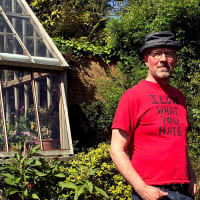
Paul Barratt
Paul Barratt started working in contemporary art galleries in 1989, having graduated in Fine Art from Goldmsith’s, London University. He initially worked at Anthony d’Offay Gallery, one of the contemporary art dealers, who dominated the London art market in the 80s and 90s. He was approached by the Lisson Gallery to be gallery manager for the influential art dealer Nicholas Logsdail. This was followed by a short period in New York at Gladstone Gallery, to work for visionary art dealer Barbara Gladstone, working with the artist and filmmaker Matthew Barney.
On his return to London, Paul secured a place on the postgraduate curatorial course at the Royal College of Art, to complete an MA. After graduation in 2001, he worked as an independent curator on several projects in Oslo, London, Brighton and Basel, before joining Paul Vater at his design agency Sugarfree in 2004. He has worked with Paul ever since.




